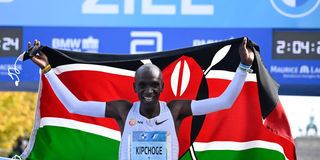Kipchoge is larger than sports

Kenya's Eliud Kipchoge celebrates after winning the Berlin Marathon race on September 25, 2022, in Berlin.
What you need to know:
- The spectacular success of Kipchoge and other long-distance stars from Ethiopia, Uganda, Morocco and others is an allegory of the possibility of national progress and African global competitiveness.
- He and his ilk have taken natural resources and opportunity and turned them into world-beating products. It is something Africa is very bad at.
- If we all were Kipchoges, we would say Africa will be a world superpower and richest continent, and just do it.
On Sunday, Eliud Kipchoge made world headlines again when he crashed his own world record with a time of two hours, one minute, and nine seconds in the Berlin Marathon.
With that, he sliced 30 seconds off his previous best mark of 2:1:39 on the same course in 2018.
Ethiopia’s Tigist Assefa won the women’s race in a course record 2:15:37. There were two remarkable things about that.
First, it was a head-spinning 18 minutes faster than she had ever run before. Secondly, she wasn’t on anyone’s favourite-to-win list.
Kipchoge is not a pimple-faced lad in his late teens. He is 37. Yet he had run so fast he crossed the line four minutes and 49 seconds ahead of his compatriot Mark Korir.
If Kipchoge had been given to the dramatic, he would have had a rapid shower and dried himself just as Korir came home.
But there he was, saying, “My legs and my body still feel young. But the most important thing is my mind, and that also feels fresh and young.” The man might bring this thing below two hours before he turns 40.
If this were just about the marathon, it wouldn’t be in the op-eds but on the sports page.
The spectacular success of Kipchoge and other long-distance stars from Ethiopia, Uganda, Morocco and others is an allegory of the possibility of national progress and African global competitiveness.
He and his ilk have taken natural resources and opportunity and turned them into world-beating products. It is something Africa is very bad at.
The Democratic Republic of Congo is said to be the most resource-rich country but it has done bugger all with it.
It is one of the poorest and remains mired in conflict. If you have that much natural wealth, you can buy a lot of peace and stability with it if you are smart in its use; ask the Saudis, Emiratis and Qataris.
There have been plans to build a Grand Inga dam on River Congo. Its potential can provide up to 40 per cent of the continent’s electricity needs.
That, proponents proudly say, would be more than twice the electricity generated by the most powerful dam in the world—the Three Gorges Dam, in China. Nothing has happened.
A Kipchoge treatment would have that dam up and supply power-cut-plagued South Africa and Nigeria.
Plagued by shortages
Take Lake Victoria, Africa’s largest lake by area, the world’s largest tropical lake and the second-largest freshwater lake by surface area in the world.
It is shared by Tanzania, Uganda and Kenya. If the three countries did what Kipchoge does, they would be the largest suppliers of freshwater fish.
Instead, they import fish from China (which the Chinese catch from other African waters and re-export to the continent).
Until recently, Nigeria was Africa’s largest exporter of oil. But due to corruption, theft and sabotage, it’s now fourth, behind Angola, Algeria and Libya.
Save for Algeria, all the other three import refined petroleum products. And Nigeria and Angola are plagued by shortages at the fuel pump. If Nigeria did a Kipchoge, it would be a world-leading exporter of refined fuel.
Economists keep throwing figures about to show that Africa is de-industrialising.
That could be because they are measuring the wrong thing. One of the biggest industries in Africa is whining and moaning about how the Europeans, the Americans, the Chinese, the Gulf states, and everyone else is exploiting and rigging the global system against us.
Yes, global injustices and imperialist exploitation must be called out and resisted, but the payoff is in overcoming and bragging about it.
Africa is paralysed by whining and blaming all its miseries on an evil world. Too many of us believe that it is impossible to overcome the odds.
In 2019, Kipchoge tackled this problem by demonstrating that the “impossible” is possible. Running records are notoriously hard to break.
The first official marathon world record was made at the 1908 Olympics by John Hayes of the USA team.
He ran it in 2:55:18. It has taken humanity 114 years to shave 54 minutes off it. By now, we have long been to the moon, landed on Mars and cloned animals.
Running the marathon in under two hours seemed like something that would wait for another generation—until Kipchoge had something to do with it. He broke the two-hour barrier in the Ineos1:59 Challenge, in Vienna in 2019, clocking 1:59:40.02.
The historic result didn’t count toward an official marathon official, however, because he ran it under controlled near-laboratory conditions.
He was the only competitor and had 41 pacesetters, divided into nine teams. That meant for every four kilometres plus, he had a set of fresh pacesetters. But the point had been made.
If we all were Kipchoges, we would say Africa will be a world superpower and richest continent, and just do it.
Mr Onyango-Obbo is a journalist, writer, and curator of the “Wall of Great Africans”. @cobbo3




